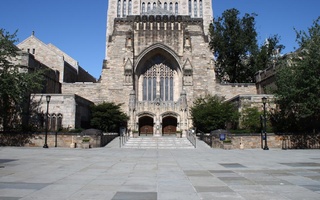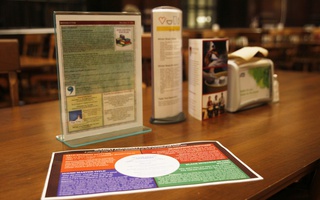Harvard College administrators apologized for the creation and distribution of controversial placemats that advise students on how to discuss topics of race and diversity with family members, saying the materials failed to respect principles of academic freedom.
In an email sent to undergraduates on Wednesday night, Dean of Student Life Stephen Lassonde and Dean of Freshmen Thomas A. Dingman ’67 wrote that while they believed the guide had well-intentioned goals, it was “not effectively presented” and “failed to account for the many viewpoints that exist on our campus.”
“On behalf of the Office of Student Life and the Freshman Dean’s Office, we offer our sincere apologies for this situation,” they wrote, acknowledging that they had received feedback on the placemats in the few days since their distribution. {shortcode-3228651ef2b6fa74bdb23d3c1a4e3bf517eeacbe}
University President Drew G. Faust also criticized the placemats in an interview Thursday, calling the initiative “a really bad idea.”
“I don’t think the University should be directing people—students, staff, faculty—what to say or what to think,” Faust said. “The University is a place that ought to foster robust discussion and disagreement, and welcome all perspectives, and that did not seem to be consistent with the message of the placemats.”
The placemats offer hypothetical answers to four controversial issues, including student activism on college campuses, the recently announced title change for Harvard’s “House Masters,” and the possible entrance of Syrian refugees into the United States. In response to one hypothetical question, “Why are Black students complaining?” the placemat suggests that undergraduates respond by saying “When I hear students expressing their experiences on campus I don’t hear complaining.”
In an interview earlier this week, Dingman—whose office produced the placemats in collaboration with the College’s Office for Equity, Diversity, and Inclusion—lauded them as a platform to start “constructive dialogue” about race.
But several undergraduates, including more than a dozen Undergraduate Council representatives, swiftly criticized the placemats, which administrators distributed in a number of campus dining halls.
The Harvard Republican Club posted a parody of the placemats on their Facebook page on Tuesday with the heading “Holiday Placemat for Common Sense.” Mimicking the original placemats, the document maintains the same four-category layout but instead includes statements such as “I’ve printed out some convenient political opinions to have and share with your parents!” along with suggested responses to the statements. The document argues that College administrators should not pressure undergraduates into taking a singular stance on controversial topics.
Eighteen UC representatives also co-signed a letter on Wednesday criticizing the Office for Equity, Diversity, and Inclusion for disseminating what they called “party-line talking points” that stand in contrast to the College’s mission of open debate.
“We do not think the offices of the university should be in the business of disseminating ‘approved’ positions on complex and divisive political issues,” the letter says.
UC Vice President Daniel V. Banks ’17 wrote in an emailed statement on behalf of himself and UC President Shaiba Rather ’17 that the pair “fully support” the UC members’ opposition to the placemats, despite their own decision against signing the letter. Still, Banks wrote that the pair believed administrators’ intention was to “start dialogue” on topics of diversity.
Aaron I. Henricks ’16, former president of the Harvard Republican Club, said he was “pleased that the administration was so responsive to many students standing up for common sense and openness in our discourse at Harvard.”
In their email to undergraduates, Lassonde and Dingman wrote that they view academic freedom as “central” to the College. Lassonde declined to comment beyond the content of his Wednesday night email. Dingman did not respond to request for comment.
—Staff writers Mariel A. Klein and Theodore R. Delwiche contributed to the reporting of this story.
—Staff writer Jalin P. Cunningham can be reached at jalin.cunningham@thecrimson.com. Follow her on Twitter @JalinCunningham.
—Staff writer Ignacio Sabate can be reached at ignacio.sabate@thecrimson.com. Follow him on Twitter@ignacio_sabate.
Read more in News
Behind the Fox Club’s Closure, A Club Divided














